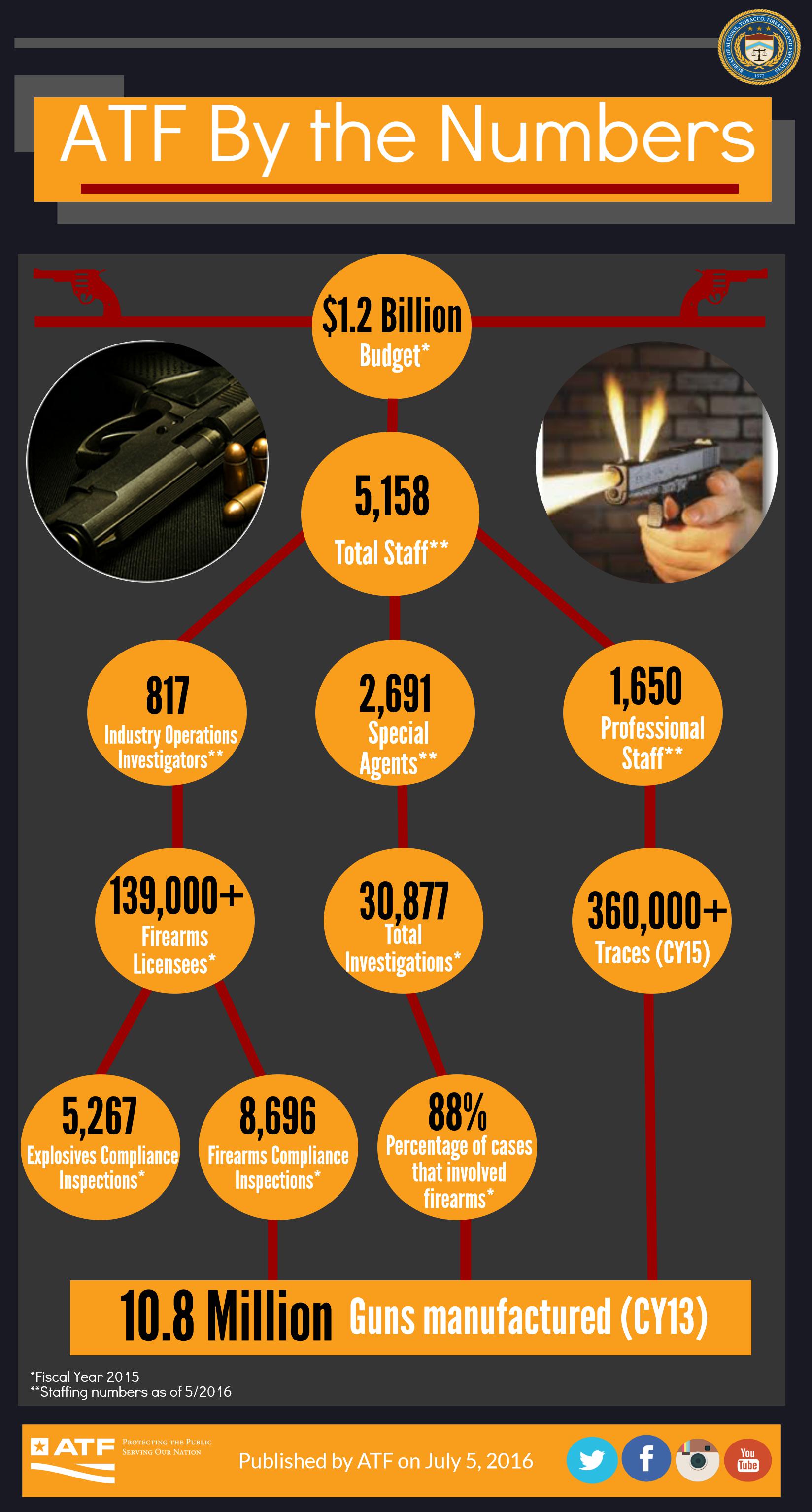What Does ATF Stand For? A Comprehensive Guide To The Bureau Of Alcohol, Tobacco, Firearms And Explosives
Understanding the abbreviation ATF is essential for anyone interested in the workings of federal law enforcement agencies in the United States. ATF stands for the Bureau of Alcohol, Tobacco, Firearms and Explosives. This agency plays a crucial role in enforcing federal laws related to the manufacture, distribution, and use of alcohol, tobacco, firearms, and explosives. In this article, we'll delve into the details of the ATF, its responsibilities, and its impact on society.
The ATF is often mentioned in the news, particularly when discussing gun control, organized crime, or large-scale criminal investigations. However, many people still wonder, "What does ATF stand for?" and what exactly the agency does. This article aims to provide a clear and detailed answer to that question.
As part of the U.S. Department of Justice, the ATF operates under specific mandates that shape its mission and activities. Understanding its role is not only important for law enforcement professionals but also for citizens who want to stay informed about how their government works to ensure public safety.
- What Does Air Bnb Stand For A Comprehensive Guide To Understanding Airbnb
- What Happened To David Dahmer A Comprehensive Look Into His Life And Controversies
Table of Contents
- What Is ATF?
- History of ATF
- ATF Mission and Responsibilities
- Enforcement of Laws
- ATF Structure
- ATF Operations and Programs
- Firearms Regulation
- Explosives and Arson
- Tobacco and Alcohol Regulation
- ATF Challenges and Controversies
- Future of ATF
What Is ATF?
The ATF, or the Bureau of Alcohol, Tobacco, Firearms and Explosives, is a federal law enforcement agency within the U.S. Department of Justice. Its primary mission is to protect the public by enforcing federal laws related to firearms, explosives, arson, and the illegal trafficking of alcohol and tobacco products.
Definition of ATF
ATF stands for the Bureau of Alcohol, Tobacco, Firearms and Explosives. The agency is responsible for regulating and enforcing laws related to these areas. It works to prevent crime and protect communities by ensuring compliance with federal regulations.
Through its enforcement efforts, ATF aims to reduce violent crime, combat illegal firearms trafficking, and prevent the illegal use and distribution of alcohol and tobacco products.
- How Tall Is Karlanthony Towns An Indepth Look At The Nba Superstar
- How Old Is Floyd Mayweather A Comprehensive Guide To The Boxing Legends Life And Career
History of ATF
The origins of the ATF can be traced back to the late 19th century when the federal government first began regulating alcohol and tobacco products. Over time, the agency's responsibilities expanded to include firearms and explosives.
Evolution of ATF
In 1972, the ATF was officially established as a separate bureau within the U.S. Department of the Treasury. In 2003, it was transferred to the U.S. Department of Justice, where it remains today. This move was part of broader reforms aimed at enhancing coordination among federal law enforcement agencies.
The evolution of ATF reflects the growing complexity of the issues it addresses. From combating organized crime to addressing modern threats like domestic terrorism, ATF has adapted to meet the challenges of a changing world.
ATF Mission and Responsibilities
The ATF's mission is to protect the public by enforcing federal laws related to firearms, explosives, arson, and the illegal trafficking of alcohol and tobacco products. To achieve this mission, ATF focuses on several key areas:
- Enforcing federal firearms laws
- Regulating the manufacture and distribution of alcohol and tobacco products
- Investigating incidents involving explosives and arson
- Combating violent crime and illegal firearms trafficking
ATF's responsibilities extend beyond enforcement. The agency also provides training and support to state and local law enforcement agencies, fostering collaboration and information sharing.
Enforcement of Laws
ATF agents are highly trained professionals who specialize in enforcing federal laws related to firearms, explosives, arson, and the illegal trafficking of alcohol and tobacco products. Their work involves a range of activities, including:
Investigative Techniques
ATF agents use a variety of investigative techniques to uncover criminal activity. These include undercover operations, surveillance, and the use of informants. ATF also employs cutting-edge technology to enhance its investigative capabilities.
Collaboration with other law enforcement agencies is a key component of ATF's enforcement efforts. Through partnerships with local, state, and federal agencies, ATF is able to tackle complex cases that span multiple jurisdictions.
ATF Structure
The ATF is organized into several divisions, each responsible for a specific area of its mission. These divisions work together to ensure the effective enforcement of federal laws.
Key Divisions
- Field Operations: Oversees ATF's investigative activities across the country.
- Regulatory Programs: Ensures compliance with federal regulations related to firearms, explosives, and alcohol.
- Training and Development: Provides training and support to ATF agents and other law enforcement professionals.
ATF's organizational structure allows it to respond quickly and effectively to emerging threats and challenges.
ATF Operations and Programs
ATF operates a variety of programs designed to support its mission and enhance public safety. These programs focus on areas such as firearms tracing, explosives detection, and arson investigation.
Firearms Tracing Program
ATF's Firearms Tracing Program helps law enforcement agencies track the movement of firearms used in criminal activity. By analyzing data from firearms manufacturers, dealers, and other sources, ATF is able to identify patterns and trends in illegal firearms trafficking.
This program is a valuable tool for combating violent crime and has led to the successful prosecution of numerous criminals involved in illegal firearms activity.
Firearms Regulation
ATF plays a critical role in regulating firearms in the United States. This includes overseeing the manufacture, importation, and distribution of firearms, as well as enforcing federal laws related to firearms ownership and use.
Key Firearms Laws
- Gun Control Act of 1968
- Brady Handgun Violence Prevention Act
- National Firearms Act
ATF works closely with firearms manufacturers, dealers, and other stakeholders to ensure compliance with these laws. Through education and outreach, ATF helps to promote responsible firearms ownership and use.
Explosives and Arson
ATF is also responsible for investigating incidents involving explosives and arson. These investigations often involve complex forensic analysis and collaboration with other law enforcement agencies.
Explosives Detection and Response
ATF maintains a specialized Explosives Detection and Response Team that provides support to law enforcement agencies across the country. This team is equipped with the latest technology and expertise to detect and neutralize explosive devices.
Through its arson investigation program, ATF works to identify and prosecute individuals responsible for setting fires that endanger lives and property.
Tobacco and Alcohol Regulation
In addition to its work on firearms and explosives, ATF also regulates the manufacture and distribution of alcohol and tobacco products. This includes enforcing federal laws related to taxation, labeling, and advertising.
Key Tobacco and Alcohol Laws
- Internal Revenue Code
- Federal Alcohol Administration Act
- Family Smoking Prevention and Tobacco Control Act
ATF's efforts in this area help to ensure that alcohol and tobacco products are produced and sold in compliance with federal regulations, protecting consumers and generating revenue for the government.
ATF Challenges and Controversies
Like any large organization, ATF faces a number of challenges and controversies. These include balancing enforcement with civil liberties, addressing public concerns about gun control, and managing limited resources.
Public Perception and Criticism
ATF's work often attracts public attention, particularly when it involves high-profile cases or controversial policies. Critics argue that some of ATF's actions infringe on individual rights, while supporters emphasize the agency's role in protecting public safety.
ATF strives to address these concerns through transparency, community engagement, and collaboration with stakeholders.
Future of ATF
The future of ATF will be shaped by ongoing changes in technology, society, and the law enforcement landscape. As new threats emerge, ATF will continue to adapt and evolve to meet the needs of the public it serves.
Key priorities for ATF in the coming years include enhancing cybersecurity, improving data analytics capabilities, and fostering stronger partnerships with other law enforcement agencies.
Looking Ahead
ATF's commitment to protecting public safety and enforcing federal laws will remain unwavering. By staying ahead of emerging trends and technologies, ATF will continue to play a vital role in ensuring the safety and security of communities across the United States.
Conclusion
In conclusion, the ATF, or the Bureau of Alcohol, Tobacco, Firearms and Explosives, plays a crucial role in enforcing federal laws related to firearms, explosives, arson, and the illegal trafficking of alcohol and tobacco products. Its mission to protect the public is supported by a range of programs and initiatives designed to combat crime and promote safety.
We encourage readers to share their thoughts and questions in the comments section below. For more information on ATF and its activities, be sure to explore other articles on our site. Together, we can stay informed and engaged in the ongoing effort to ensure public safety and justice for all.
- George Strait Passed Away A Tribute To The King Of Country Music
- Salt Lake City Mall A Complete Guide To Shopping Dining And Entertainment

What does ATF stand for in text? answeringeverything/

ATF By The Numbers Bureau of Alcohol, Tobacco, Firearms and Explosives

What does ATF stand for in transmission fluid? answeringeverything/